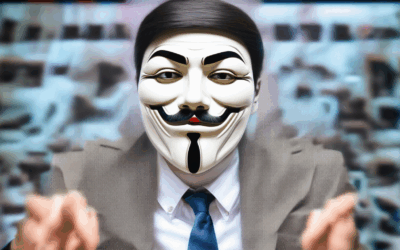In today’s hyper-connected digital world, the way we express ourselves has evolved dramatically, often masked behind screens. Among the most fascinating aspects of this evolution is the phenomenon of social anonymity—how individuals choose to share their thoughts, opinions, and experiences without revealing their true identities. This enigmatic practice has become a cornerstone of online discourse, influencing everything from political debates to personal reflections. While anonymity offers a sense of freedom and protection, it also raises profound questions about identity, responsibility, and the very nature of human interaction. In this exploration, we’ll delve into the complexities of social anonymity, examining its implications across various domains of life and its impact on the way we understand and engage with societal issues.
Key Takeaways
– Right to Anonymity in the U.S.: Protected under the First Amendment, as upheld by Supreme Court rulings, including McIntyre v. Ohio Elections Commission.
– Anonymity’s Role in Open Discourse: Facilitates free expression on sensitive topics, supported by platforms like AnonyPost, fostering a healthier online community.
– Limitations of Anonymity: Not absolute, with potential restrictions for public safety and national security.
– Anonymity as a Legal Concept: Not inherently a crime, though its usage varies based on context and jurisdiction.
– Privacy as a Fundamental Right: Recognized globally, with legal frameworks like the Universal Declaration of Human Rights and the General Data Protection Regulation (GDPR).
– Aspects of Privacy Protection: Includes the right to be free from surveillance, protection of personal data, and respect for private spaces.
– Balancing Privacy and Security: Requires global cooperation and ethical guidelines, such as the EU’s Artificial Intelligence Act and UN’s Global Privacy Governance.
– Corporate Responsibility: Companies like Apple and Meta lead by example, prioritizing user consent for data usage.
– Conclusion on Privacy and Anonymity: Both are crucial for individual freedoms and societal progress, necessitating a balance between protection and accountability.

What is the Social Anonymity Theory?
The social anonymity theory posits that individuals may exhibit altered behavior when they perceive themselves as less visible or identifiable in a group setting. This phenomenon is rooted in psychological principles and has been studied extensively in the field of social psychology.
- Definition: The theory suggests that when people feel anonymous, they may engage in behaviors or expressions that they would otherwise suppress in public settings.
- Historical Context: The concept was first explored by psychologist Joseph Plummer in 1983, who noted that anonymity can lead to a sense of disinhibition and reduced social concern.
- Key Components:
- Disinhibition: Anonymity often reduces inhibitions, leading to riskier actions or statements.
- Reduced Social Concern: Individuals may feel less accountability and empathy toward others when they are anonymous.
- Behavioral Effects: According to the theory, anonymity can increase the likelihood of antisocial or unconventional behavior, as individuals may feel less observed or judged.
- Real-World Applications: The theory has been invoked to explain various phenomena, including cyberbullying, online trolling, and certain types of criminal behavior.
The theory has sparked significant debate among psychologists and sociologists. While some argue that it provides valuable insight into human behavior, others caution against overgeneralizing its implications. The ongoing discussion highlights the complexity of social dynamics and the multifaceted nature of human behavior.
US Supreme Court’s Opinion on Anonymous Speech
The US Supreme Court has consistently recognized the importance of anonymous speech as a fundamental aspect of the First Amendment. While this right is not absolute, the court has repeatedly emphasized its significance in protecting political participation and free association.
Key rulings include:
- Whitney v. California (1927) : The Supreme Court struck down a California law requiring a permit for public assemblies, affirming the constitutional protection of anonymous speech.
- Brandenburg v. Ohio (1969) : The court held that inciting violent conduct does not receive First Amendment protection unless it occurs in a peaceful context, establishing boundaries for anonymous expression tied to potential harm.
Lower courts have generally followed these precedents, applying similar protections to anonymous speech online. The Supreme Court has also highlighted the importance of safeguarding anonymous speech to prevent government censorship and protect individual privacy, reinforcing its status as a core First Amendment right.

Why Anonymity Can Be Harmful on Social Media
Anonymity on social media can have several negative effects, impacting both users and the platforms they inhabit. While it may offer a sense of freedom, it often leads to behaviors that undermine trust and accountability.
- Lack of Accountability: Anonymous users may engage in harmful behavior without facing consequences. This includes trolling, cyberbullying, and spreading misinformation, as there’s no record of who performed the action.
- Erosion of Trust: When users cannot be identified, it becomes difficult to verify the authenticity of information shared. This can lead to skepticism and a fragmented community.
- Spread of Misinformation: Anonymity can facilitate the rapid dissemination of false information, potentially causing widespread panic or confusion. This is particularly concerning during crises or sensitive events.
- Online Harassment: Without identifiable profiles, instances of harassment and abuse may go unaddressed. Victims may struggle to find support or press charges due to the lack of evidence.
These challenges highlight the importance of balanced approaches to anonymity on social media, ensuring that users feel safe to express themselves while also maintaining accountability and preventing harm.

Do Americans Have a Right to Anonymity?
The right to anonymity in the United States is a protected aspect of free speech under the First Amendment. This principle has been upheld by the Supreme Court in several cases, including McIntyre v. Ohio Elections Commission , which emphasized the importance of protecting anonymous speech in certain contexts.
Anonymity allows individuals to express themselves without fear of retribution or judgment, fostering open discourse on sensitive topics. Online platforms like AnonyPost provide spaces for users to share thoughts, opinions, and engage in conversations without revealing their identities, thereby safeguarding their right to privacy and free expression.
However, this right is not absolute and may be limited in situations where anonymity could compromise public safety or national security. Despite these limitations, the general consensus supports the protection of anonymity as a fundamental component of democratic discourse.
For instance, platforms like AnonyPost enable users to participate in discussions on social issues, lifestyle choices, and political debates without fear of identification. This feature not only protects individual freedoms but also contributes to a healthier online community by encouraging diverse perspectives and open dialogue.
In conclusion, Americans do have a right to anonymity, which is enshrined in the Constitution and supported by court rulings. This right is essential for maintaining free speech and enabling citizens to engage in societal discussions confidently and securely.
Is Anonymity a Crime?
Anonymity refers to the condition of being unknown or unidentifiable. Whether it is considered a crime depends on the context and jurisdiction. In some cases, laws may require individuals to disclose their identities under specific circumstances, such as during police questioning or when engaging in certain public interactions.
Legal Considerations
In many jurisdictions, there are laws that mandate individuals to reveal their identities. For instance, some U.S. states have “stop and identify” statutes that require individuals to provide their full name and address when requested by law enforcement, particularly when there is a reasonable suspicion of criminal activity.
Ethical and Privacy Implications
While some forms of anonymity may be legally required, others are protected as a fundamental aspect of privacy. The right to anonymity is often seen as essential for protecting individual freedoms and preventing discrimination or harassment. However, it can also be exploited for illegal purposes, such as fraud or cybercrime.
Balancing Privacy and Security
Governments and organizations often face the challenge of maintaining security while respecting individual privacy. Measures like anonymous voting systems or whistleblower protections aim to safeguard privacy rights while still allowing for necessary oversight. These systems help ensure that individuals can participate in societal processes without fear of retribution.
Technological and Platform Policies
In the digital age, many platforms require users to provide personal information for registration and identification. While this enhances security and reduces misuse, it can also limit the ability to engage in anonymous communication, affecting freedom of speech and privacy.
Conclusion
Anonymity is not inherently a crime, but its usage and legality depend on the context and applicable laws. Understanding these nuances helps in navigating the complexities of privacy and accountability in modern society.

Do All Humans Have a Right to Privacy?
Privacy is considered a fundamental human right, protected under international law and recognized as essential for individual autonomy and dignity. The right to privacy ensures individuals can control information about themselves, prevent unauthorized access, and safeguard against misuse of personal data.
Legal Foundations
International agreements like the Universal Declaration of Human Rights and the International Covenant on Civil and Political Rights affirm the right to privacy. Article 17 of the ICCPR specifically protects individuals from arbitrary interference with their privacy, family, home, or correspondence.
Key Aspects of Privacy
- Right to Be Free from Surveillance: Individuals have the right not to be monitored without cause, ensuring freedoms from invasive technologies like mass surveillance.
- Protection of Personal Data: Laws like the General Data Protection Regulation (GDPR) in Europe mandate companies to handle personal information responsibly, with explicit consent required for data collection.
- Respect for Private Spaces: The right to privacy extends to physical spaces such as homes, workplaces, and public areas, safeguarding against unreasonable searches and intrusions.
Challenges in the Digital Age
While privacy rights are well-established, modern technology poses significant challenges. Issues like facial recognition , data collection , and cybersecurity threats require careful balancing with public safety and innovation.
Ethical Frameworks and Solutions
Organizations and governments are developing ethical guidelines to address privacy concerns. Initiatives like the EU’s Artificial Intelligence Act and the UN’s Global Privacy Governance aim to create standards that protect individual rights while enabling technological progress.
Corporate Responsibility
Businesses play a critical role in respecting and protecting privacy. Companies like Apple and Meta have established policies requiring user consent for data usage, setting a benchmark for others to follow.
Conclusion
The right to privacy is a cornerstone of human dignity, yet its implementation faces complex challenges. Balancing technological advancements with individual freedoms requires global cooperation and adherence to ethical standards. By fostering awareness and enforcing legal protections, society can ensure that privacy remains a universal human right in the digital age.




0 Comments